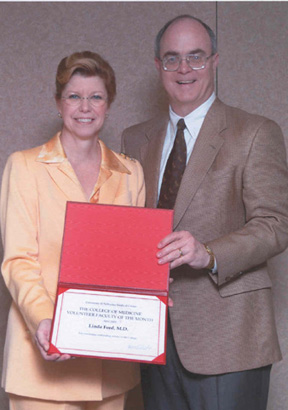 |
Linda Ford, M.D., and UNMC College of Medicine Dean James Armitage, M.D. |
“When we graduate from medical school we take an oath, and in that oath we say we will be teachers of the next generation,” Dr. Ford said. “I’ve always felt that you have to give back.”
For nearly 20 years Dr. Ford, a nationally known allergy and immunology expert, has welcomed internal medicine, pediatric and family practice residents to her Papillion clinic. Each resident spends one month observing, asking questions and learning from Dr. Ford.
For her continued volunteer service, Dr. Ford received the UNMC College of Medicine’s Volunteer Faculty of the Month Award for April.
“She is an excellent teacher who has provided instruction and teaching materials on allergy-immunology,” said Michael A. Sitorius, M.D., professor and chairman of the department of family medicine.
Resident praises Dr. Ford
For family practice resident Martha Reyes, M.D., the experience boosted her confidence.
“It was great,” Dr. Reyes said. “Dr. Ford explains everything to you, teaches you how to take the correct history and to know when to send a patient to an allergist.”
Career path
Dr. Ford graduated from UNMC in 1975 and is the chief executive officer of The Asthma & Allergy Center, P.C., in Papillion.
She is currently the chair of the Nebraska delegation to the American Medical Association, on the board of directors of the American Medical Association Foundation and is a member of the advisory panel to the Wellness Council of America.
Locally, Dr. Ford was part of the development and evaluation of the Omaha Public Schools Emergency Asthma Protocol, is clinical assistant professor at the Creighton University School of Medicine and is clinical associate professor of pediatrics at UNMC.
Knowing what to look for
Dr. Ford believes every resident should have a basic understanding of asthma and allergies, know what to look for in a patient and how to help that person feel better.
“Twenty percent of the patients these residents will see in their family practice will have some type of allergy,” she said. “They are going to see allergies every day. I try to give them the tools to help those people.”
Dr. Reyes agrees. “Sometimes allergies are overlooked,” she said.
Full circle
Dr. Ford said the biggest compliment she receives is when a former resident refers a patient to her clinic.
“It’s nice to know that they have the confidence in me to refer their own patients to me,” she said.